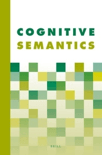
Cognitive Semantics
Scope & Guideline
Charting New Territories in Cognitive Linguistics
Introduction
Aims and Scopes
- Cognitive Linguistics Exploration:
The journal publishes research that investigates how cognitive processes shape language structure and use, emphasizing the mental representation of meaning. - Metaphor and Figurative Language Studies:
A significant focus is on the role of metaphor and other figurative language forms in communication, examining their cognitive underpinnings and implications for understanding. - Multimodal Semantics:
Research often incorporates multimodal perspectives, analyzing how various modes of communication (verbal, gestural, visual) contribute to semantic meaning. - Cross-Linguistic and Cultural Analysis:
The journal encourages studies that explore semantic structures across different languages and cultures, shedding light on universal versus language-specific cognitive processes. - Application of Cognitive Theories to Language Teaching:
Papers frequently address the practical implications of cognitive semantics for language education, including metaphor use in foreign language instruction.
Trending and Emerging
- Cognitive-Emotional Interactions:
There is an increasing focus on how emotions influence semantic understanding and language use, highlighting the interconnections between cognitive and affective processes. - Embodied Cognition:
Research emphasizing embodied cognition is on the rise, exploring how physical experiences shape language and meaning, reflecting a broader trend in cognitive science. - Metaphor in Educational Contexts:
The application of metaphor research to language instruction and pedagogy is gaining prominence, suggesting an interest in practical implications for teaching and learning. - Multimodal Analysis:
Emerging studies are increasingly examining the role of gestures, visual elements, and other modalities in semantic interpretation, indicating a shift towards more holistic approaches to communication. - Interdisciplinary Approaches:
There is a growing trend towards interdisciplinary research that combines insights from linguistics, psychology, neuroscience, and cultural studies, fostering a more comprehensive understanding of semantics.
Declining or Waning
- Traditional Syntax-Semantics Interfaces:
There has been a noticeable decrease in studies strictly focused on traditional syntax-semantics interfaces, as the field moves towards more integrated cognitive approaches. - Static Semantic Models:
Research employing static, rigid models of semantics is less frequent, indicating a shift towards dynamic, context-sensitive approaches that account for variability in meaning. - Formal Semantics:
The influence of formal semantics has waned, with a growing preference for cognitive and experiential models that prioritize human cognition over formal theoretical frameworks. - Descriptive Case Studies:
While descriptive case studies were once common, there is a trend toward more theoretical and interdisciplinary approaches that seek broader insights rather than isolated analyses.
Similar Journals
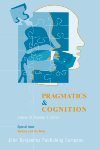
Pragmatics & Cognition
Bridging Disciplines Through Language and CognitionPragmatics & Cognition, published by John Benjamins Publishing Co, is an esteemed journal that serves as a cross-disciplinary platform for the study of language, cognition, and context-dependent communication. With its ISSN 0929-0907 and E-ISSN 1569-9943, the journal has established a notable reputation since its inception in 1993, although its coverage spans various fields from behavioral neuroscience to linguistics and philosophy. Recognized for its scholarly contributions, it holds impressive Scopus rankings, significantly within Linguistics and Language, where it ranks in the 63rd percentile among peers. Although it currently maintains a Q4 designation in Behavioral Neuroscience and a Q1 in Linguistics and Language as of 2023, the journal appeals to a diverse audience addressing the intricate relationships between language use and cognitive processes. As researchers and academics navigate this evolving landscape, Pragmatics & Cognition remains pivotal in fostering essential dialogues and advancing knowledge in the interdisciplinary field, providing rich content that is both insightful and relevant.

CogniTextes
Advancing Linguistic Understanding, One Article at a Time.CogniTextes (ISSN: 1958-5322) is an esteemed open access journal published by the Association Française de Linguistique Cognitive, dedicated to the exploration of cognitive linguistics and its intersection with textual interpretation. Since its inception in 2007, CogniTextes has been a vital platform for disseminating cutting-edge research that delves into the cognitive processes underlying language use, enhancing our understanding of linguistics in a cognitive context. This journal not only fosters scholarly communication among researchers and professionals but also serves as a valuable resource for students keen on advancing their knowledge in cognitive linguistics. With its headquarters located at the University of Lille 3 in France, CogniTextes encourages contributions from a diverse spectrum of disciplines, thereby enriching the field of linguistics and cognitive studies. The journal's commitment to open access ensures that its findings are readily available to a global audience, thus facilitating knowledge sharing and academic discourse.

Lege Artis-Language Yesterday Today Tomorrow
Fostering Interdisciplinary Insights into LanguageLege Artis: Language Yesterday Today Tomorrow is a pivotal open access journal dedicated to the dynamic and multifaceted study of language, linguistics, and communication in contemporary society. Published by the esteemed University of SS Cyril & Methodius in Trnava, Slovakia, this journal serves as a vital platform for scholars and practitioners to explore the evolution of language and its impact on culture and society. With an ISSN of 2453-8035, Lege Artis has embraced open access since 2016, ensuring that its valuable research findings are freely available to all, thus promoting wider dissemination and engagement within the academic community. The journal invites contributions that enrich the understanding of linguistic theory, historical linguistics, sociolinguistics, and applied linguistics, making it an essential resource for researchers, educators, and students alike. By fostering an interdisciplinary approach, Lege Artis aims to contribute significantly to our understanding of language as a living entity, continuously evolving and adapting to societal changes.
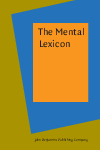
Mental Lexicon
Illuminating the Pathways of Language and CognitionMental Lexicon is a leading academic journal published by JOHN BENJAMINS PUBLISHING CO that spans significant interdisciplinary terrains including Cognitive Neuroscience and Linguistics. Since its inception in 2006, the journal has gained a prestigious reputation, currently holding a Q1 tier in Linguistics and Language and a Q3 rating in Cognitive Neuroscience based on 2023 categorizations. With impressive Scopus rankings—247 out of 1088 in Language and Linguistics and 94 out of 115 in Cognitive Neuroscience—it serves as a critical platform for the dissemination of innovative research and theoretical advancements in mental lexicon studies. The journal fosters an environment for scholars, researchers, and students to explore the complexities of language processing and cognitive functions, thereby contributing to the realization of our understanding of the mind and language. While Mental Lexicon operates under closed access, it remains an essential resource for those seeking to delve into the intricate relationship between linguistic capabilities and cognitive processes.

JOURNAL OF MEMORY AND LANGUAGE
Exploring the Interplay Between Memory and LanguageJOURNAL OF MEMORY AND LANGUAGE, published by Academic Press Inc Elsevier Science, is a prestigious journal dedicated to advancing the understanding of cognitive processes related to language and memory. With an impact factor that underscores its authority and relevance, the journal has achieved remarkable recognition, ranking in the Q1 quartile across multiple disciplines such as Artificial Intelligence, Experimental and Cognitive Psychology, Linguistics and Language, and Neuropsychology and Physiological Psychology, as of 2023. With its origins tracing back to 1985, the journal continually provides a platform for high-quality research and innovative studies that intersect diverse fields including cognitive science and linguistics. Although it does not offer open access, the Journal of Memory and Language serves as an essential resource for researchers and professionals seeking to explore the intricate interplay between memory and language. Make sure to access state-of-the-art research that not only informs theoretical frameworks but also has practical implications in real-world situations.

Cadernos de Estudos Linguisticos
Advancing linguistic frontiers through open dialogue.Cadernos de Estudos Linguisticos, published by UNIV ESTADUAL CAMPINAS, INST ESTUDOS LINGUAGEM, stands as a pivotal platform in the field of linguistic studies since its inception in 1978. With its commitment to Open Access, this journal fosters the dissemination of cutting-edge research, ensuring that knowledge is accessible to a global audience. This also enhances collaboration among researchers, professionals, and students dedicated to exploring the nuances of language. The journal proudly carries the ISSN 0102-5767 and E-ISSN 2447-0686, attesting to its uninterrupted quality and relevance in linguistic scholarship. By addressing various facets of language studies, including syntax, semantics, and sociolinguistics, this esteemed journal is a vital resource for advancing understanding and innovation in the field.
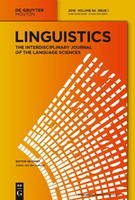
LINGUISTICS
Empowering Scholars Through Open Access KnowledgeLINGUISTICS, published by De Gruyter Mouton, stands as a leading journal in the field of linguistics, exemplifying innovation and scholarly rigor. With its roots tracing back to 1963 and a commitment to advancing linguistic research, this journal has consistently achieved Q1 status in both the Linguistics and Language category, marking it among the top-tier journals in the discipline. The journal is indexed with impressive rankings in Scopus, evidenced by its position within the 84th percentile in Language and Linguistics, and 83rd percentile in Social Sciences, demonstrating its significant influence and reach among scholars. Transitioning to Open Access since 2022, LINGUISTICS enhances accessibility and fosters a wider dissemination of knowledge. Published in Germany and backed by a reputable publisher, LINGUISTICS is dedicated to exploring diverse topics in linguistics, making it essential reading for researchers, professionals, and students aiming to stay at the forefront of linguistic scholarship.

Cognitive Studies-Etudes Cognitives
Connecting Theory to Practice in Cognitive ResearchCognitive Studies-Etudes Cognitives, published by the Polish Academy of Sciences, Institute of Slavic Studies, is a prominent open-access journal based in Poland, dedicated to advancing research in the interdisciplinary fields of cognitive studies, communication, and linguistics. Since its inception, the journal has made a significant impact in the academic community, evidenced by its ranking in the Scopus database within the top 30% for Language and Linguistics. With an aim to bridge theoretical insights and practical applications, Cognitive Studies invites contributions that explore the complex interplay between language, cognition, and technology, making it a vital resource for researchers, professionals, and students alike. As the journal continues to grow, it remains committed to maintaining rigorous standards for publication while fostering an inclusive environment for innovative ideas and diverse perspectives. The journal is easily accessible and aims to facilitate knowledge dissemination, proudly offering open access since 2014.

Russian Journal of Linguistics
Discovering the Nuances of Language TogetherWelcome to the Russian Journal of Linguistics, a prestigious journal published by Peoples Friendship University of Russia that has made significant strides in the realm of linguistic studies since its inception. With an Open Access policy established in 2019, this journal provides unparalleled opportunities for researchers, professionals, and students to share and disseminate groundbreaking linguistic research. The journal is currently ranked in the Q1 category for Linguistics and Language and boasts impressive Scopus rankings, placing 129th out of 1088 in the Arts and Humanities, and 148th out of 1167 in the Social Sciences. Focusing on a diverse range of linguistics topics, the journal aims to facilitate cross-disciplinary dialogue and foster advancements in the study of language. Located in Moscow, Russia, it champions the vibrant linguistic community by consistently publishing high-quality research that contributes to the global understanding of language dynamics. We invite you to explore the wealth of knowledge and insight the Russian Journal of Linguistics has to offer.
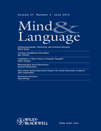
MIND & LANGUAGE
Advancing Insights at the Crossroads of Language and MindMIND & LANGUAGE, published by WILEY, is a premier academic journal that has established itself as a leading platform for interdisciplinary research at the intersection of linguistics, philosophy, and cognitive science. With a noteworthy impact factor and a remarkable ranking in the top quartiles (Q1) for both Linguistics and Language as well as Philosophy, it reflects the journal’s robust contribution to the academic community, garnering attention from researchers and scholars worldwide. Since its inception in 1986, MIND & LANGUAGE has provided an avenue for exploring the complexities of language perception, cognitive processes, and the philosophical implications of linguistic studies. Its comprehensive scope ensures that it remains a critical resource for professionals and students alike who are engaged in the exploration of language's role in human thought and society. The journal's rigorous peer-review process guarantees the high quality and scholarly integrity of the published work, making it an essential addition to any academic library.